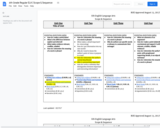
6th Grade Regular English Language Arts: Course Scope & Sequence.
- Subject:
- English Language Arts
- Material Type:
- Full Course
- Provider:
- Liberty Public Schools
- Date Added:
- 07/11/2022

6th Grade Regular English Language Arts: Course Scope & Sequence.
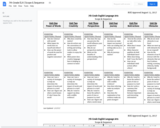
7th Grade Regular English Language Arts: Course Scope & Sequence.
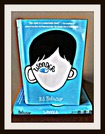
This is a 7th grade ELA lesson plan which could be used at the end of a novel study of RJ Palacio's Wonder.
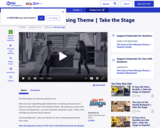
Find the theme of a story by acting it out!
Take out your magnifying glass detectives-in-training, because you’re about to solve The Case of the Missing Theme. By acting out a story with Carmen and Detective J, you will remember important clues. These clues will help you find the story’s theme!
Learning Objective: Infer the theme of a work, distinguishing theme from topic.
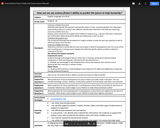
Students will learn the potential costs and benefits of social media, digital consumption, and our relationship with technology as a society in the three-week lesson. This inquiry based unit of study will answer the following questions:
Essential Question: How can we use science fiction’s ability to predict the future to help humanity?
Supportive Questions 1: What predictions of future development has science fiction accurately made in the past? This can include technology, privacy, medicine, social justice, political, environmental, education, and economic.
Supportive Question 2: What predictions for future development in contemporary science fiction are positive for the future of humanity? What factors need to begin in your lifetime to make these predictions reality?
Supportive Question 3: What predictions for future development in contemporary science fiction are negative for the future of humanity? What factors need to begin in your lifetime to stop these negative outcomes?
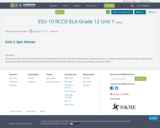
Overview of Unit: This unit will focus on the characteristics of the epic hero and students’ comprehension of complex texts. Students will explore theme and main idea within texts which focus on the epic hero through discussions, as well as generating a writing product.
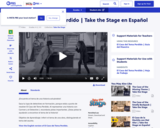
¡Encuentra el tema de una historia actuándolo!
Saca tu lupa de detectives en formación, porque estás a punto de resolver El Caso del Tema Perdido. Al representar una historia con Carmen y el Detective J, recordarás pistas importantes. ¡Estas pistas te ayudarán a encontrar el tema de la historia!
Objetivo de Aprendizaje: inferir el tema de una obra, distinguiendo el tema del asunto.

This is a project for the play Fences by August Wilson.
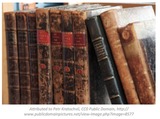
Fiction is untrue, but it can be an honest reflection of real life. In this seminar, you will make clear connections between the lives of characters in fiction to the lives of people in the real world. This will require a skill called abstracting in which you find patterns in one area and apply them to a new situation. It will also give you the opportunity to reflect on how fake worlds of literature can help resolve your own personal issues that you face currently and in the future.StandardsCC.1.3.9-10.C - Analyze how complex characters develop over the course of a text, interact with other characters, and advance the plot or develop the theme.CC.1.3.9-10.E - Analyze how an author’s choices concerning how to structure a text, order events within it and manipulate time create an effect.CC.1.3.9-10.H - Analyze how an author draws on and transforms themes, topics, character types, and/or other text elements from source material in a specific work.

This Learning Plan was created by Mae Clausen. Educators worked with coaches to create Learning Plans.Brief Overview: Students will analyze and evaluate theme and the purpose it serve to readers as they deepen their understanding/comprehension. Students will read short passages and watch Pixar shorts to determine theme.Grade Level: 3rd gradeLexile Level: 420-820 NDE Standards: LA 3.1.6.d Summarize a literary text and/or media using key details to identify the theme. Learning Objective: Students will be able to identify theme and explain its importance to a reader.Duration: 90-120 minutes to complete.
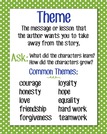
Storyies always have a message that the author is trying to share.
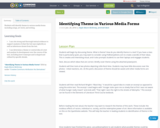
Students will identify theme in various media forms including songs, art-work, and writing.
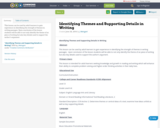
This lesson can be used by adult learners to gain experience in identifying the strength of themes in writing passages. Upon conclusion of the lesson students will be able to not only identify the theme of an piece of writing but also key details used to support the author’s argument.
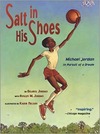
Are you looking for an enticing way to introduce identifying the theme of a story to your students? This lesson on identifying the theme of a text was created by Jennifer Bauer as an introductory lesson to understanding and analyzing a text to identify a common theme within the text. This lesson engages students by using the read aloud "Salt in His Shoes", a storybook on Michael Jordan's struggles as an adolescent, as a way to gain an understanding of the literary element of theme. This English Language Arts lesson is designed for Grades 3-5, but could also be adapted for middle school students as well. This lesson plan addresses the following NDE Standards: LA 3.1.6.d Summarize a literary text and/or media, using key details to identify the theme. LA 4.1.6.d Summarize a literary text and/or media, using key details to identify the theme. LA 5.1.6.d Summarize and analyze a literary text and/or media, using key details to explain the theme.It is expected that this lesson will take students 60 minutes to complete.
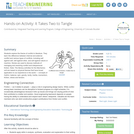
Students explore the theme of conflict in literature. They learn the difference between internal and external conflict and various types of conflicts, including self against self, self against other, and self against nature or machine. Stories are used to discuss methods of managing and resolving conflict and interpersonal friction. Note: The literacy activities for the Mechanics unit are based on physical themes that have broad application to our experience in the world â concepts of rhythm, balance, spin, gravity, levity, inertia, momentum, friction, stress and tension.

The attached Lesson Plan is designed for Third Grade English Language Arts students. Students will determine story elements and use the elements to write a summary. This Lesson Plan addresses the following NDE Standard: NE LA 3.1.6.b and NE LA 3.1.6.dIt is expected that this Lesson Plan will take students 90 minutes to complete.
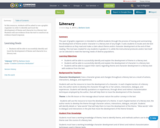
In this resource, students will be asked to use a graphic organizer in order to identify and track the development of theme and character in a literary text. Students will use evidence from the text to construct an evidence based response.
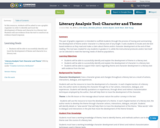
In this resource, students will be asked to use a graphic organizer in order to identify and track the development of theme and character in a literary text. Students will use evidence from the text to construct an evidence based response.

This class is an introduction to the analysis of tonal music. Students develop analytical techniques based upon concepts learned in 21M.301-21M.302. Students study rhythm and form, harmony, line and motivic relationships at local and large scale levels of musical structure. Three papers (totaling 20 pages, one to be revised) and one oral presentation are required.

This is a small group lesson plan that gives students practice with name letter recognition and fine motor skills. It would fit great into an apple thematic unit. Enjoy!